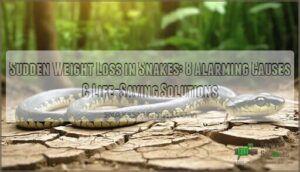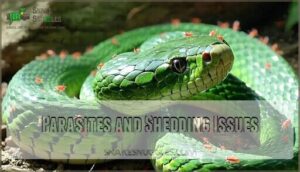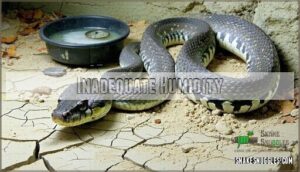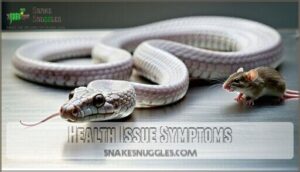This site is supported by our readers. We may earn a commission, at no cost to you, if you purchase through links.
 If you’re noticing sudden weight loss in your snake, don’t panic—but don’t ignore it either.
If you’re noticing sudden weight loss in your snake, don’t panic—but don’t ignore it either.
This could signal several issues: parasites, infections, improper temperature, stress, or digestive problems.
Your scaly friend can’t tell you when something’s wrong, so weight changes are key warning signs.
Check if your snake is eating normally and inspect its habitat for proper heating and humidity.
Look for other symptoms like unusual discharge, difficult breathing, or abnormal shedding.
Like humans dropping pounds unexpectedly, your snake’s weight loss isn’t something to shrug off.
Proper diagnosis makes all the difference between a quick recovery and a slithery slope to serious health complications, which can be caused by improper temperature, stress, or other underlying issues, and it’s crucial to address them promptly for a quick recovery.
Table Of Contents
- Key Takeaways
- Snake Weight Loss Causes
- Anorexia in Snakes
- Respiratory Issues
- Skin and Scale Problems
- Health Issue Symptoms
- Veterinary Care Options
- Diet and Nutrition
- Weight Management Strategies
- Frequently Asked Questions (FAQs)
- Why is my snake losing weight?
- What causes anorexia in snakes?
- What is stomatitis in snakes?
- Why is my snake losing scales?
- Can snakes recover from extreme weight loss?
- How quickly should weight loss be addressed?
- Are some snake species more susceptible?
- Can breeding behaviors cause weight loss?
- Do seasonal changes affect snake weight?
- Conclusion
Key Takeaways
- You should monitor your snake’s weight regularly as sudden weight loss can indicate serious health issues like parasites, infections, stress, or environmental problems that require immediate attention.
- Check for symptoms accompanying weight loss such as lethargy, abnormal odors, discharge, or regurgitation, as these can help identify the underlying cause of your snake’s condition.
- Maintain proper habitat conditions including appropriate temperature gradients (76-82°F cool side, 87-94°F warm side), correct humidity levels, and adequate hiding spots to prevent stress-induced appetite loss.
- Consult an exotic veterinarian promptly if you notice weight loss, as early intervention drastically improves recovery chances and allows for proper diagnosis through tests like fecal analysis, blood work, and specialized treatments.
Snake Weight Loss Causes
You’ll notice your snake is losing weight when scales start to look loose or its spine becomes more prominent than usual.
Parasites, infections, poor cage conditions, and nutritional problems are the main culprits behind this weight loss, much like how you’d slim down quickly if you caught a nasty bug or stopped eating your favorite foods.
This comparison highlights the potential causes, including parasites, which can significantly impact your snake’s health.
Parasite Infections
Parasites can burrow deep into your snake’s system, causing dramatic weight loss despite normal feeding.
I’ll create a short, engaging blockquote that captures the essence of that paragraph about parasites causing weight loss in snakes:
Silent thieves within: parasites drain your snake’s nutrients while leaving their appetite deceptively intact.
These tiny invaders steal nutrients and damage internal organs, leaving your pet malnourished.
Four common parasitic culprits include:
- Cryptosporidium (often fatal in snakes)
- Nematodes (roundworms)
- Pentastomids (tongue worms)
- Coccidia
Regular fecal exams and proper quarantine protocols for new snakes help prevent these infections. Remember, some snake parasites pose zoonotic risks to humans, so always wash hands after handling.
Bacterial Infections
While your snake fights bacterial infections, sudden weight loss often follows as a red flag.
Mouth rot, scale rot, and respiratory infections can quickly drain your pet’s energy and appetite. These infections invade through cuts or weakened immune systems, leading to serious health issues if left untreated.
Antibiotic treatment is essential, so watch for swollen gums, unusual discharge, or breathing difficulties. Preventing spread requires prompt vet care and thorough enclosure cleaning, which can help prevent the spread of respiratory infections and reduce the risk of serious health issues.
Fungal Infections
Many snakes suffering from fungal infections experience sudden weight loss as they struggle to eat.
Snake Fungal Disease, caused by Ophidiomyces ophiodiicola, creates facial swelling and crusty scales that can impair feeding abilities.
You’ll notice white cloudiness in the eyes or lumps under the skin.
Treatment requires antifungal medications and environmental control to prevent secondary infections.
Early identification of fungi is vital for preventing your snake from losing weight.
Nutritional Deficiencies
Pinpointing nutritional deficiencies in your snake requires attention to subtle symptoms.
Vitamin B1 deficiency causes muscular weakness and tremors, while rare hypovitaminosis C appears in malnourished specimens.
You’ll notice your snake’s sudden weight loss might stem from inadequate diet variety or poor prey quality.
Mineral depletion and vitamin imbalance require prompt supplementation needs.
Proper UVB lighting is also essential for calcium absorption.
Like humans skipping breakfast, snakes need proper nutrition to thrive—proper diet variety prevents these issues, ensuring a healthy and thriving snake with adequate diet.
Anorexia in Snakes
You’ll notice your snake has anorexia when it consistently refuses meals, often due to stress, improper habitat conditions, or underlying health issues that trigger their natural "hunger strike" response.
Just like how you’d lose interest in food when feeling unwell, your scaly friend’s appetite shutdown is their body’s warning system that something needs attention, whether it’s a simple temperature adjustment or a more serious medical concern related to their natural "hunger strike" response and overall health.
Stress and Environmental Factors
Stress from poor habitat conditions can affect your snake’s health and eating habits.
Common environmental factors include:
- Enclosure size: A space too small or large can trigger anxiety.
- Temperature gradient: Without proper warm and cool zones, digestion suffers.
- Water quality and hiding spots: Dirty water or lack of safe spaces adds stress.
Fix these and watch your snake thrive!
Loss of Appetite
Sometimes, a snake’s refusal to eat feels like its version of “I’m not in the mood.”
Stress-induced anorexia is often triggered by environmental changes or poor handling. These stressors can lead to snake anorexia, causing noticeable weight loss.
Appetite recovery requires addressing stress and making dietary changes. Fixing snake feeding problems starts by resolving environmental triggers and ensuring a calm, stable setup.
Reduced Food Intake
Snake feeding problems often start small but lead to snake weight loss fast.
Reduced food intake can result from dietary imbalances, environmental stressors, or underlying illnesses.
Even behavioral factors like handling too often can throw off feeding schedules.
Digestion issues or a lack of appetite might mean trouble, too.
If your snake’s losing weight, check for these causes, and don’t ignore it, as it can lead to serious trouble, and ultimately, weight loss.
Respiratory Issues
If your snake seems to breathe noisily or struggles to take in air, it could be battling a respiratory issue.
Ignoring this might lead to serious problems, so catching it early is key to keeping your scaly friend healthy.
Labored Breathing
If your snake’s breathing sounds like a leaky tire, it’s time to check the enclosure.
Low humidity levels or poor temperature can trigger respiratory problems. Breathing problems like labored breathing or airway obstruction might indicate pneumonia.
A vet may use lung auscultation to diagnose. Early care, including medication options, stops snake weight loss and restores health.
Infections and Diseases
Labored breathing can hint at snake health issues like infections or diseases.
Mouth rot causes pain and eating trouble, while severe cases of Cryptosporidiosis lead to rapid weight loss.
Organ failure from snake infections or tumors also disrupts digestion.
Dehydration worsens everything by lowering immunity.
Tackling these snake diseases promptly is key to preventing serious consequences and avoiding further snake weight loss, which is crucial for maintaining overall snake health and preventing rapid weight loss.
Environmental Factors
If your snake’s environment isn’t just right, it can cause stress and weight loss.
Poor water quality or failure to maintain a proper temperature gradient disrupts their health.
Watch out for these environmental pitfalls:
- Enclosure size that’s too cramped.
- Sudden temperature or humidity changes.
- Lack of hiding spots for security.
- Infrequent cage cleaning.
- Inconsistent temperature adjustments.
Small fixes can mean big relief for your snake, especially when it comes to maintaining the right environment to prevent weight loss.
Skin and Scale Problems
If your snake’s scales look patchy, loose, or discolored, it could be hiding a bigger problem beneath the surface.
Skin issues like infections, parasites, or shedding trouble can quickly lead to weight loss if left untreated, and this is often related to skin issues.
Lesions and Wounds
Small wounds or lesions on a snake’s body can quickly become serious, leading to infections and even snake weight loss.
Pay close attention to wound severity.
Clean cuts with reptile-safe solutions and promote the healing process using topical treatments.
Healthy scale regeneration indicates progress.
Infection prevention is key—keep the enclosure spotless and handle your snake gently during recovery.
Parasites and Shedding Issues
Parasites and shedding problems can wreak havoc on a snake’s health, causing issues like weight loss and discomfort.
Here’s how to help:
- Treat mite infestations promptly—they weaken snakes through blood loss.
- Address internal parasites with a vet’s help.
- Prevent dysecdysis by ensuring proper humidity.
- Use preventative quarantine for new snakes to avoid parasitic infections.
Effective snake mite treatments are readily available.
Healthy scales mean a happy snake!
Improper Temperature
Your snake’s temperature gradient is vital. Without a warm basking spot (87-94°F) or proper night temperatures (76-82°F), digestion and immunity suffer.
A thermostat helps maintain balance. Inconsistent heating methods can stress your pet and lead to illness or weight loss. Check regularly using a thermometer.
A quality reptile thermostat is essential for maintaining a stable environment.
| Temperature Zone | Ideal Range | Tools Needed | Potential Problems |
|---|---|---|---|
| Basking Spot | 87-94°F | Heat lamp, thermostat | Digestion stops, illness |
| Cool Side | 76-82°F | Thermometer | Stress, reduced appetite |
| Night Temperatures | 76-82°F | Under-tank heater | Illness, weight loss |
| Temperature Gradient | Gradual Shift | Probe thermometer | Improper shedding, illness |
Inadequate Humidity
Many snake owners underestimate the vital role humidity plays in reptile health.
Inadequate humidity directly contributes to weight loss through:
- Dehydration causing poor digestion and nutrient absorption
- Difficult shedding (dysecdysis) that stresses your snake’s system
- Increased vulnerability to respiratory infections that suppress appetite
Invest in a quality hygrometer for humidity monitoring. You can also purchase a snake humidity reader for accuracy.
Different species require specific hydration levels – ball pythons need 50-60% humidity, while tropical species may need 70-90%. Your snake’s weight depends on it, making proper care essential for their health.
Poor Substrate and Enclosure
Beyond humidity issues, your snake’s home itself might be causing weight loss.
Filthy enclosures harbor bacteria that lead to infections and stress. The wrong substrate can cause toxicity or impaction.
Is your enclosure too small? Snake cage conditions should include proper hiding spots, excellent water quality, and a temperature gradient.
Poor husbandry practices like inadequate cleaning or cramped spaces can turn your pet’s home into a weight-loss trap.
Health Issue Symptoms
You’ll want to watch for early warning signs that accompany weight loss in your snake, as these symptoms can be your first clue that something’s wrong.
Just like how we humans might feel tired when fighting an illness, your scaly friend will show specific symptoms such as unusual lethargy, strange odors, or food coming back up that can help pinpoint the underlying health problem.
Lethargy and Decreased Energy
Your snake’s once lively movements have slowed to a crawl – a glaring red flag of potential health issues linked to weight loss.
When your pet shows decreased energy, pay attention to these activity level impacts:
- Spending excessive time hiding or motionless in one spot
- Decreased tongue flicking and environmental exploration
- Slow or delayed response to handling or food
- Minimal movement during active periods
- Difficulty maintaining normal posture
These signs can indicate serious health problems, so it’s crucial to monitor your snake’s behavior and consult a veterinarian if you notice any of these symptoms.
Abnormal Odors and Discharge
Through your snake’s enclosure, unusual smells or discharge can signal serious health problems.
Foul odors often indicate mouth rot or respiratory infections, while discharge from the mouth, nose, or vent suggests infection.
You’ll notice these symptoms alongside your snake losing weight.
Check your pet’s hygiene practices daily, as early odor identification can save lives.
Don’t wait—veterinary intervention is vital when you detect these infection indicators.
Regurgitation and Vomiting
When your snake throws up its meal, it’s often a red flag for underlying health issues causing weight loss.
Regurgitation differs from vomiting and requires immediate attention.
- Digestive stress from prey size being too large can trigger regurgitation
- Handling too soon after meals forces food back up
- Cryptosporidiosis infection causes chronic vomiting and severe weight loss
- Improper temperatures prevent proper digestion, leading to regurgitated meals
To avoid this, make certain proper enclosure conditions to minimize stress and ensure proper digestion.
This will help prevent chronic vomiting and promote a healthy environment for your snake.
Veterinary Care Options
When your snake starts shedding pounds faster than a reptile on a crash diet, it’s time to call in the professionals.
Your reptile vet can perform critical diagnostic tests like fecal analysis and blood work to pinpoint the exact cause of weight loss.
They can then create a customized treatment plan to address the issue.
Regular Check-Ups
In the case of preventing sudden weight loss in your snake, regular check-ups are your first line of defense.
Schedule veterinary exams every 6-12 months for early detection of potential issues. Your vet can spot subtle changes you might miss!
Consistent weight monitoring between visits helps track patterns that signal health concerns.
Remember, preventative care is like an insurance policy for your scaly friend—it’s always worth the investment, and regular monitoring can help with early detection of potential issues, ensuring the health and well-being of your pet through consistent weight monitoring.
Diagnostic Tests
When your snake shows sudden weight loss, diagnostic tests become your best allies.
Your reptile veterinarian will likely recommend fecal analysis to detect parasites, blood work to check organ function, and x-rays to examine internal structures.
For more complex cases, biopsies or endoscopy might be necessary to look inside your pet’s digestive tract.
These tests are like detective tools that uncover hidden health issues your eyes can’t see.
Treatment and Supportive Care
Veterinary treatment for a struggling snake often begins with fluid administration to combat dehydration.
Your veterinarian might recommend assisted feeding if your pet hasn’t eaten in weeks.
Antibiotic therapy tackles bacterial infections causing weight loss, while environmental enrichment reduces stress.
Pain management helps your snake feel comfortable enough to eat again, and dietary adjustments for snakes should match your vet’s recommendations – sometimes smaller, more frequent meals work wonders for reptile recovery.
Diet and Nutrition
You’ll need to feed your snake properly to prevent weight loss, just like you wouldn’t run a car without gas.
What you offer your pet serpent – from prey size and nutritional content to feeding frequency – directly impacts their health and can quickly reveal underlying problems when something’s wrong.
You should consider the health implications of your feeding choices, as they directly affect your snake’s well-being.
Balanced Diet and Feeding Schedule
Establishing a balanced diet and consistent feeding schedule forms the backbone of your snake’s health.
You’ll need to match feeding frequency to your snake’s species, age, and activity level. Most adult snakes eat every 7-14 days, while juveniles need more frequent meals.
Remember, proper nutrition prevents snake weight loss and obesity. For baby boas, adhere to a strict feeding schedule to promote healthy growth.
Don’t forget hydration importance—always provide fresh water. Supplement occasionally with prey variety to guarantee complete nutrition.
Prey Size and Quality
Now that you’ve established a consistent feeding schedule, let’s talk about what you’re actually feeding your snake.
Selecting the right prey size and quality directly impacts your snake’s weight and overall health.
Your prey choices matter tremendously for preventing snake weight loss:
- Feeding a mouse too large can stress your snake’s digestive system
- Low-quality prey sources might harbor hidden parasites
- Thawed frozen prey that’s not warmed properly gets rejected
- Wild-caught feeders can introduce dangerous diseases
- Inconsistent prey type confuses your snake’s feeding response
Choose appropriate prey size—creating a visible but not excessive bulge after feeding.
Quality prey from reputable sources guarantees proper nutritional balance while reducing health risks.
Nutritional Deficiencies and Supplements
Beyond selecting the right prey size, your snake’s health depends on proper nutrients.
Vitamin deficiencies can cause serious health problems and weight loss in reptiles.
Snakes require proper UVB lighting to aid in vitamin D3 synthesis.
| Deficiency | Symptoms | Solution |
|---|---|---|
| Vitamin B1 | Muscle weakness, tremors | Supplement or varied prey |
| Vitamin C | Poor health in malnourished snakes | Gut-loaded prey items |
| Vitamin E | Issues from oily fish diets | Rotate prey sources |
Remember, a balanced snake diet prevents most nutritional deficiencies.
Consider "gut-loading" prey with vitamins before feeding to ensure your snake receives all necessary nutrients for optimal health, including preventing vitamin deficiencies and promoting overall well-being.
Weight Management Strategies
You’ll need a reliable system to catch weight problems before your snake turns into skin and bones (or conversely, a tubby noodle).
Regular weighing and thoughtful adjustments to diet, feeding schedule, and habitat conditions will help your serpent friend maintain that sleek, healthy physique that makes other reptile owners green with envy.
Monitoring Weight Changes
The key to catching weight problems early is regular monitoring.
Keep a weight journal for your snake by weighing them monthly on a digital scale.
Record these measurements to spot concerning trends before they become dangerous.
Early detection of sudden weight loss allows for prompt veterinary consultation.
Think of weight monitoring as your snake’s health dashboard—it signals when something’s off before visible symptoms appear.
Even small changes can reveal big problems!
Early detection is crucial, and by monitoring weight regularly, you can ensure your snake receives the care it needs when it needs it, which can be a matter of life.
Adjusting Diet and Feeding Frequency
Now that you’re tracking your snake’s weight, it’s time to fine-tune their meals.
Adjust your feeding schedule based on their condition—underweight snakes may need smaller, more frequent meals, while overweight ones require longer intervals between feedings.
Consider prey variety to guarantee balanced nutrition, and remember, portion control is vital—prey should create a visible but not excessive bulge.
Always tailor dietary adjustments to your specific snake’s species, age, and health status.
Environmental Adjustments and Stress Reduction
Creating the right environment for your snake can make all the difference when managing weight issues. Reducing stress through environmental adjustments helps restore normal feeding patterns.
- Add hiding spots in both warm and cool areas of the enclosure
- Maintain proper temperature gradients (76-82°F cool side, 87-94°F warm side)
- Monitor humidity levels appropriate for your snake species
- Establish consistent lighting schedules that mimic natural patterns, which helps in reducing stress and creating a comfortable environment for your snake to thrive, with proper environmental adjustments.
Frequently Asked Questions (FAQs)
Why is my snake losing weight?
Your snake’s weight loss could be from parasites, infections, poor diet, incorrect habitat conditions, or stress.
Check its temperature settings, feeding routine, and look for symptoms like unusual discharge.
A vet visit is recommended.
What causes anorexia in snakes?
Your snake’s refusal to eat can stem from stress, illness, improper temperature, shedding, or seasonal changes.
Environmental factors and handling stress might also trigger anorexia.
Regular vet check-ups help identify specific causes.
What is stomatitis in snakes?
Stomatitis or "mouth rot" is an infection in your snake’s mouth lining.
You’ll notice redness, swelling, and sometimes pus.
It’s painful for your pet and requires prompt veterinary treatment to prevent complications.
Why is my snake losing scales?
Like autumn leaves falling, your snake’s scales might be shedding naturally or indicating health issues.
Check for mites, fungal infections, poor humidity, or improper substrate that can cause abnormal scale loss, which might be a sign of health issues.
Can snakes recover from extreme weight loss?
Yes, with proper veterinary care, your snake can bounce back from extreme weight loss.
You’ll need to address the underlying cause, adjust husbandry practices, and follow a careful refeeding plan for successful recovery.
How quickly should weight loss be addressed?
Time waits for no reptile!
You should address weight loss immediately upon noticing it, as early intervention dramatically improves recovery chances.
Don’t delay – what takes weeks to lose often requires months to regain.
Are some snake species more susceptible?
Ball pythons, boa constrictors, and corn snakes with faster metabolisms face higher weight loss risks.
You’ll notice certain species struggle more when stressed or ill, particularly younger snakes and those with specialized diets.
Can breeding behaviors cause weight loss?
Just as dancers lose pounds during performance season, your snake can drop weight during breeding.
Your male might stop eating while pursuing females, and females often lose weight developing and laying eggs, which can be a complete concept to consider in the care of your snake.
Do seasonal changes affect snake weight?
Seasonal changes absolutely affect your snake’s weight.
During winter brumation periods, they’ll naturally eat less and lose some weight.
In spring and summer, they’ll typically increase feeding and regain that seasonal weight loss, which is a natural part of their annual cycle, influenced by brumation periods.
Conclusion
Remember, monitoring your snake’s weight is essential for catching health issues early.
When dealing with sudden weight loss in snakes, quick action is your best defense.
Consult your exotic vet at the first sign of trouble, maintain proper habitat conditions, and follow feeding guidelines for your specific species.
You’re not just a snake owner—you’re their health advocate! With proper care and attention, your slithery companion will stay healthy for years to come, and this makes you a key player in their overall well-being.




















